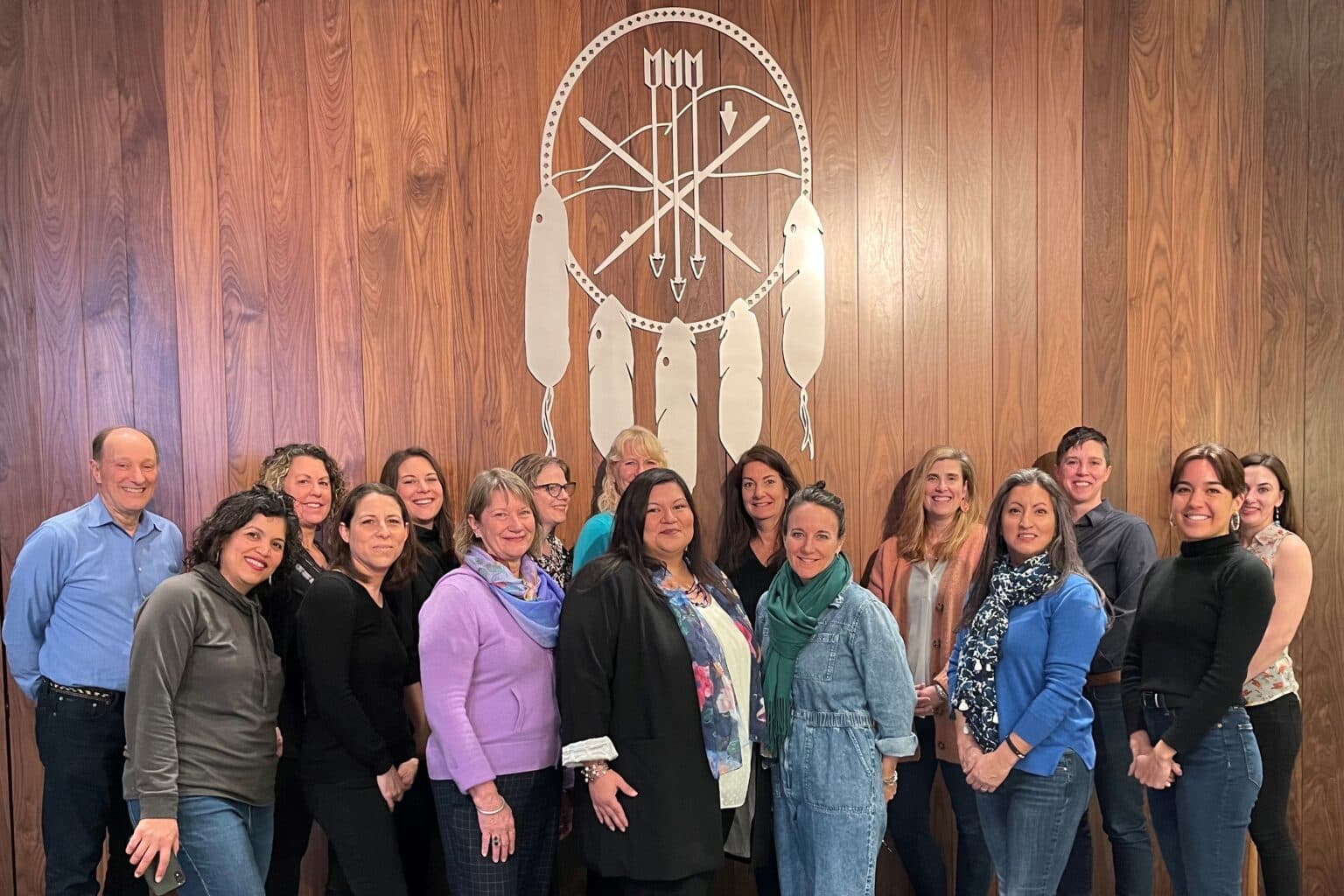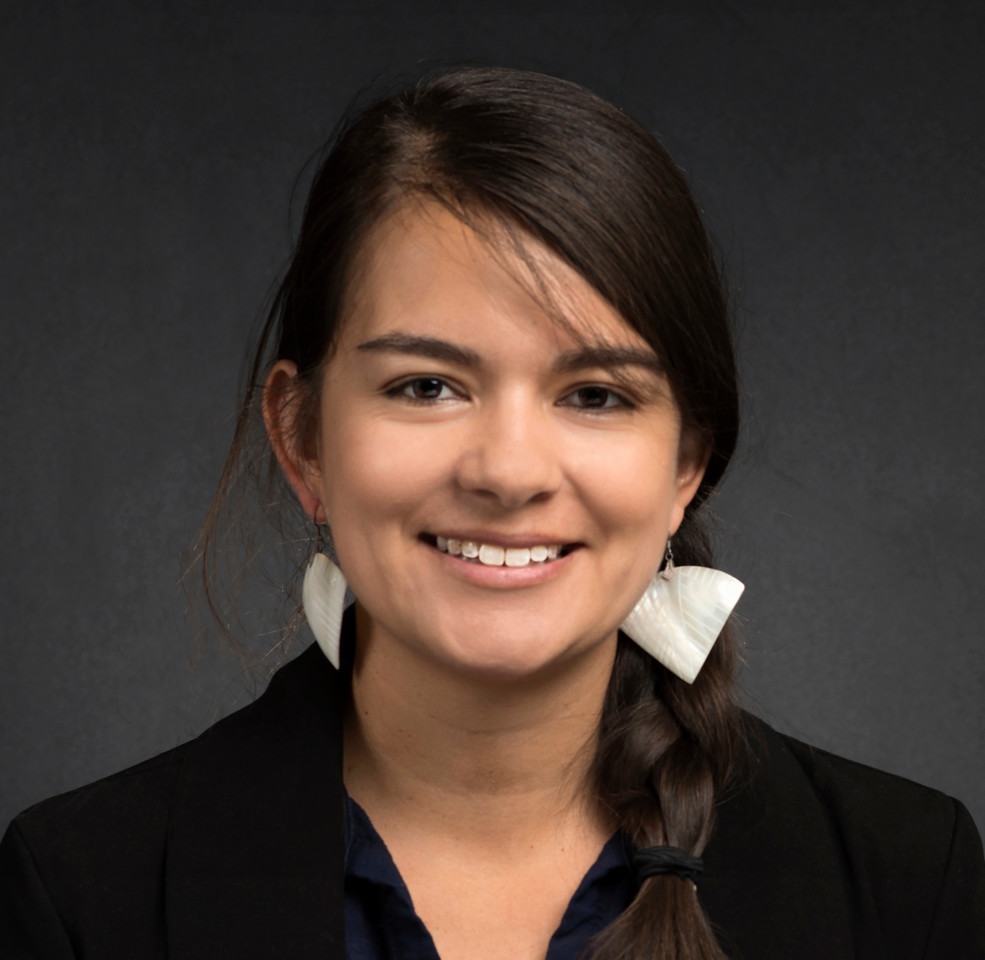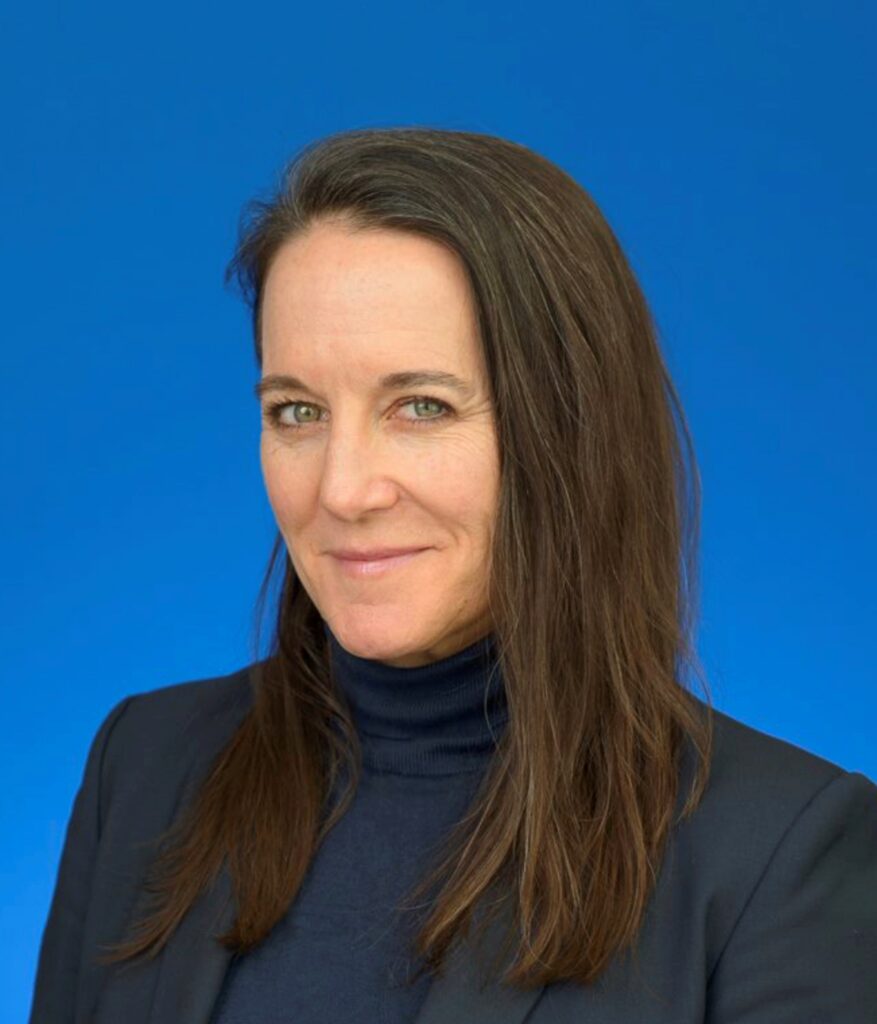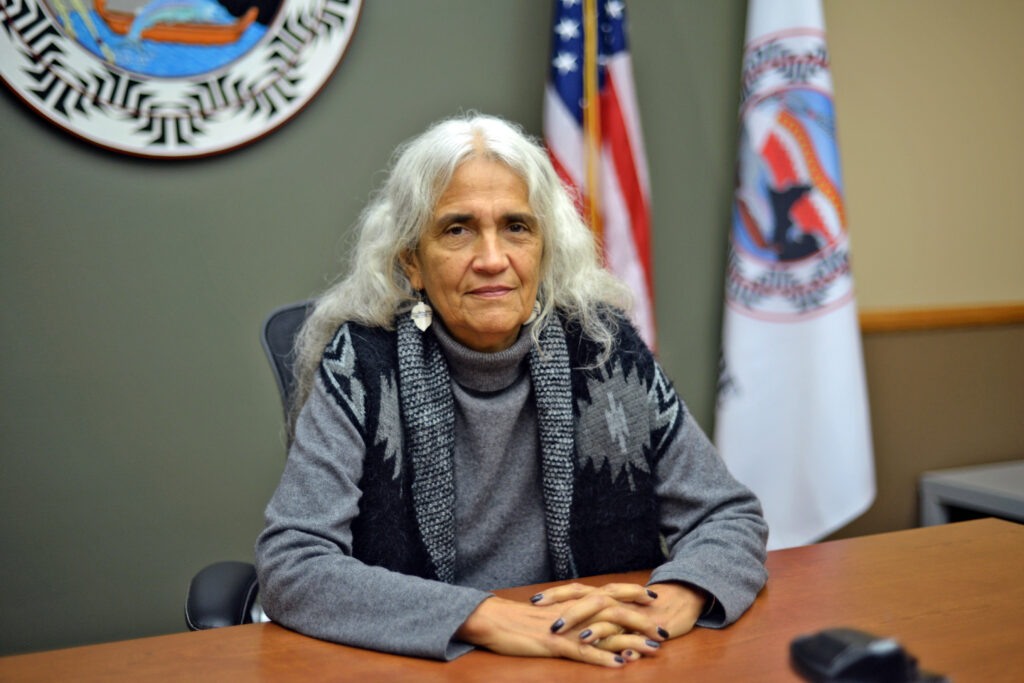The billboard project is expanding to Oregon
Indian Child Welfare Act Think Tank to Strategize Legal Protections for Tribal Sovereignty
Nancy Marie Spears
The Imprint

A group photo from the California ICWA Institute’s gathering on February 27 and 28, which took place at Arizona State University’s California Center in downtown Los Angeles. Photo provided by the California Tribal Families Coalition.
With the Supreme Court months away from ruling on a case that could throw out longstanding protections for Indigenous children and families, a new think tank has formed to advance legal and political strategies to protect tribal sovereignty.
Roughly 20 volunteer members met this week in downtown Los Angeles to launch the California ICWA Institute, referring to the federal Indian Child Welfare Act. The group is composed of tribal court judges, social workers and child welfare experts. Their work in the state that is home to 109 of the nation’s 577 tribes will include:
- Developing statutes that preserve tribes’ rights to participate in state child welfare proceedings and protect their members
- Drafting model legal briefs to support related litigation and policies
- Identifying strategies to increase funding for Indian children in state and tribal child welfare systems.
Members describe their work as urgent.
In June, the nation’s highest court is expected to rule on Brackeen v. Haaland. The lawsuit takes aim at the 1978 federal law known as ICWA, a statute that ensures tribal members and their courts will be prioritized when Native children come to the attention of child welfare authorities. The landmark law was enacted by the 95th Congress during a time when 25% to 35% of Indigenous children were removed from their families, separated from their tribal cultures and adopted into white, Christian homes.
Opponents of ICWA argue it is a race-based law that never had Congressional authority for approval, and that violates state’s rights.
The new ICWA think tank intends to bolster legal arguments to battle that position and devise ways to protect tribes from future legal attacks. The institute was first announced within days of the Supreme Court’s November oral arguments in the Brackeen case, but formally launched during an in-person convening at Arizona State University’s California campus on Monday and Tuesday.
“As I think about the future of ICWA and the future of a post-Brackeen world, it always has, should and must depend on the well-being of tribal governments and tribal child welfare,” said University of California, Los Angeles assistant law professor Lauren van Schilfgaarde, one of the participating experts. “How can we better support, uplift and ultimately depend on those systems?”

The California ICWA Institute, described as the first of its kind, is in the early development stage and there are as yet few specific policies or legal briefs to reference. But those involved have extensive background in issues that arise from cases of parental abuse and neglect, and in federal Indian law — which refers to the thousands of treaties, executive orders, statutes and court decisions that define the unique legal and political status of the over 550 federally recognized American Indian and Alaska Native tribes and their relationship with the U.S. government. These doctrines rely on the foundational recognition of tribal sovereignty.
The new institute is a collaboration under the California Tribal Families Coalition, and funded by grants and donations from the Native American Rights Fund and Casey Family Programs. Participants include Blair Kreuzer and Delia Sharpe, co-executive director and founding executive director of the California Tribal Families Coalition, 2023 recipients of the prestigious James Irvine Leadership Award.
Kimberly Cluff, an attorney, is the institute’s legal director. Cluff described its aim as working more broadly in the field of Indigenous children and family rights, rather than fighting case by case; she noted that “the other side continues to work on their strategies 24-7.”

In addition to broader policy and legal guidance, offerings will include professional toolkits for legal advocates working for tribes and frequently asked questions documents.
“We are unaware of any other think tank-like entity in the United States focusing specifically on protecting tribal child welfare in light of Brackeen,” Cluff said, adding that she welcomes contact with others doing similar work or those who may seek to collaborate. “If people think this is a model that might be helpful in other regions, for example, we think that would be wonderful.”
She also noted that the nation’s conservatives have long leveraged this model to drive litigation and push for policies that chip away at Native rights. The Brackeen case for example — which argues that ICWA is a race-based law that discriminates against white people seeking to adopt Native children — is backed by the Goldwater Institute. The Libertarian Arizona-based think tank has argued against ICWA in more than a dozen cases since 2015.
Naomi Schaefer Riley, author of “No Way to Treat a Child,” and a senior fellow at the right-leaning American Enterprise Institute has spoken out repeatedly against ICWA. In a Feb. 21, 2023 opinion piece for the Minneapolis Star Tribune co-authored by attorney Mark Fiddler — a member of Turtle Mountain Band of Chippewa Indians who now serves as co-counsel to the adoptive parent plaintiffs in Brackeen — describes the law as a policy that hurts children. Giving preferential treatment to members of tribes and Native families seeking to take in Indigenous foster children violates equal protection laws under the constitution, they argue.
“However the Supreme Court case turns out, it is a mystery why ICWA continues to be viewed as the ‘gold standard’ solution states should emulate to prevent the future disproportionate placement of Indian children,” Fiddler and Riley wrote in February. “No data support its success.”
The two wrote another op-ed for Newsweek last year headlined “The Case Against the Indian Child Welfare Act,” arguing that because ICWA prioritizes Indigenous foster homes, Native children can spend more time in the foster care system and suffer being wrenched from non-Native families they may have connected with.
“Any child welfare policy that produces this kind of trauma is not really a policy concerned with the welfare of a child,” Fiddler and Riley wrote.
***
Brackeen v. Haaland is the third Supreme Court challenge to the federal ICWA law. And although that case sparked the institute’s creation, participants say shoring up the legal defense of tribes on a variety of topics vital to their existence will also be a central aim.
The Brackeens, a white evangelical couple from Texas who sought to adopt a Navajo and Cherokee toddler, and two other sets of adoptive parents from Minnesota and Nevada are backed by high-powered law firms taking aim at tribal sovereignty over land, water and gaming rights. If ICWA is determined to be race-based rather than based on agreement between nations — the U.S. and the tribes — then many other bedrocks could crumble, legal analysts say.
As an example, a Washington State court case focusing on the constitutionality of the Indian Gaming Regulatory Act — protecting a vital source of tribal revenue — also put forth claims that federal law is race-based and violates equal protection laws. The plaintiffs in the Washington case, which was dismissed February 21, were represented by the same international law firm currently representing the foster parents in Brackeen: Gibson Dunn & Crutcher.
Any precedent set in Brackeen could be far-reaching.
“Brackeen’s threat to the Indian Child Welfare Act is actually a bundle of a bunch of different threats,” said van Schilfgaarde, who is Cochiti Pueblo and currently serves on the Native American Concerns Committee for the American Bar Association. “Brackeen seems to be asking the court some really basic foundational questions that have very little to do with child welfare, and have everything to do with federalism, the nature of federal Indian law, tribal sovereignty and the powers that Congress has or doesn’t have.”
In its ongoing work, the California ICWA Institute will be guided by an advisory council that includes legal experts to provide feedback on reports, legal briefs or policy papers before they are released. Council members include Kate Fort of the Turtle Talk legal blog; William Thorne, who retired from the Utah Court of Appeals in 2013, after serving as a tribal court judge in 10 states; Dean Stout, chief judge of the Bishop Paiute Tribal Court and Judge Abby Abinanti, chief judge of the Yurok Tribe.
Thorne, an enrolled member of Pomo and Coast Miwok Indian tribes, said the council will meet later to strategize “about how to preserve the best practices already implemented and how to then spread those best practices to other communities.”
Judge Abinanti said given that California has the largest population of tribal members of any state, ICWA plays a critical role in defending against unnecessary Indigenous family separation through foster care and adoption. And despite the federal protections, after centuries of genocide, stolen land, forced assimilation and Indian boarding school abuses, Native children in the state and nationwide remain the most likely to be taken into the child welfare system, state and federal data show.

“We are responsible as human beings who believe in interlocking responsibility to unite for our children and serve as guides to those who have come to our world. We are uniting to meet this core responsibility,” Abinanti said. “It is what our ancestors have taught us and what we know to be right. The institute will become warriors for the protection of children and families.”
Disclosure: Casey Family Programs is one of the funders of Fostering Media Connections, The Imprint’s parent nonprofit. Per our policy, the organization had no editorial role in this story.
This story is being co-published with The Imprint, a nonprofit news outlet covering child welfare and youth justice.
External
Identification not yet made
UTTC International Powwow attendees share their rules for a fun and considerate event
Radio collaboration highlights importance of cooperation in a season of funding cuts for local media
A memorial in the Snow County Prison, now the United Tribes Technical College campus
Standing Rock Sioux Tribal Chairwoman Janet Alkire tells crowd, ‘We’re going to rely on each other’






